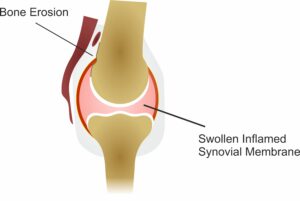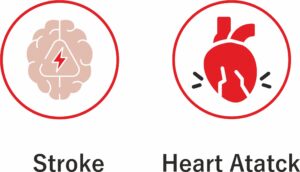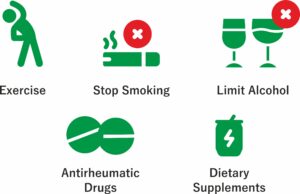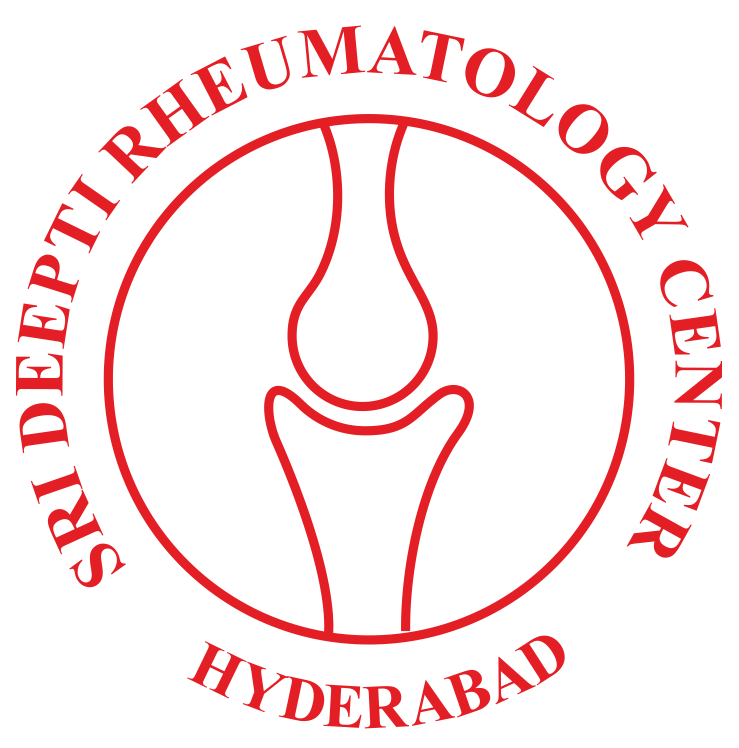Rheumatoid Arthritis
 Rheumatoid arthritis is an inflammatory arthritis of the joints. The term Rheumatoid is derived from the Greek word “Rheum” meaning flow, as this condition was thought to be similar to a river of pain flowing through the joints. It was identified in late 19 th century in patients with severe joint deformities. This condition affects around 0.5% of the population and more often seen in women, up to three times compared to men. Though it was previously thought to be more common in younger age groups, this condition can also occur in older age groups typically above 50 years of age. This is termed as a Bimodal peak; therefore, it is important to note this condition can occur at any age.
Rheumatoid arthritis is an inflammatory arthritis of the joints. The term Rheumatoid is derived from the Greek word “Rheum” meaning flow, as this condition was thought to be similar to a river of pain flowing through the joints. It was identified in late 19 th century in patients with severe joint deformities. This condition affects around 0.5% of the population and more often seen in women, up to three times compared to men. Though it was previously thought to be more common in younger age groups, this condition can also occur in older age groups typically above 50 years of age. This is termed as a Bimodal peak; therefore, it is important to note this condition can occur at any age.
 Rheumatoid arthritis is an autoimmune condition. The immune system of the body is dysregulated due to certain triggers such as smoking, environmental factor, stress or infections in people with a genetic trait. The immune system attacks the healthy joint tissue causing inflammation. If this inflammation is untreated, it can affect the surrounding tissues and bone causing instability of the joint, leading to deformities.
Rheumatoid arthritis is an autoimmune condition. The immune system of the body is dysregulated due to certain triggers such as smoking, environmental factor, stress or infections in people with a genetic trait. The immune system attacks the healthy joint tissue causing inflammation. If this inflammation is untreated, it can affect the surrounding tissues and bone causing instability of the joint, leading to deformities.
 Joint pains associated with swellings are seen typically with early morning stiffness where in patients feel joint stiffness and restricted joint movement which can last for a few hours and in some cases all day. Wrists, small joints of the hands and knees are most commonly affected though other joints can also be involved. In long standing untreated patients, joint deformities occur due to underlying joint and bone destruction by the disease. These deformities which are not correctable and are lifelong, can be prevented by early treatment. Rheumatoid arthritis is a condition which frequently has “flare ups” meaning recurrence of symptoms in a fluctuating pattern. Smoking is a known risk factor and the disease is more severe in smokers compared to non-smokers.
Joint pains associated with swellings are seen typically with early morning stiffness where in patients feel joint stiffness and restricted joint movement which can last for a few hours and in some cases all day. Wrists, small joints of the hands and knees are most commonly affected though other joints can also be involved. In long standing untreated patients, joint deformities occur due to underlying joint and bone destruction by the disease. These deformities which are not correctable and are lifelong, can be prevented by early treatment. Rheumatoid arthritis is a condition which frequently has “flare ups” meaning recurrence of symptoms in a fluctuating pattern. Smoking is a known risk factor and the disease is more severe in smokers compared to non-smokers.
 Though joint symptoms are the most common Rheumatoid arthritis can affect multiple internal organs. This is called extra articular manifestations. Fatigue, not feeling well or general weakness which is termed malaise is present. Skin and eyes are commonly affected. Internal organs such as lungs, heart and kidneys when affected can pose long term complications. These extra articular complications are also seen more in smokers.
Though joint symptoms are the most common Rheumatoid arthritis can affect multiple internal organs. This is called extra articular manifestations. Fatigue, not feeling well or general weakness which is termed malaise is present. Skin and eyes are commonly affected. Internal organs such as lungs, heart and kidneys when affected can pose long term complications. These extra articular complications are also seen more in smokers.
Rheumatoid arthritis is diagnosed based on the clinical history and findings. Rheumatoid factor can be positive in most patients but Rheumatoid arthritis can be diagnosed even in the absence of Rheumatoid factor and this is termed as “Seronegative Rheumatoid arthritis. Anti CCP antibodies is another antibody which can be present and are more specific for Rheumatoid arthritis.
 Treatment is with medications broadly termed as Disease modifying anti Rheumatic Drugs “DMARDS”. Medications will be prescribed after careful clinical evaluation. Though side effects can occur, they are rare and these medications were found to be safe in multiple long term clinical studies. Biologics are newer group of medications which are being used to successfully treat Rheumatoid arthritis in cases where adequate clinical response is not achieved. Early and appropriate treatment is a must as the disease activity can affect the joints
Treatment is with medications broadly termed as Disease modifying anti Rheumatic Drugs “DMARDS”. Medications will be prescribed after careful clinical evaluation. Though side effects can occur, they are rare and these medications were found to be safe in multiple long term clinical studies. Biologics are newer group of medications which are being used to successfully treat Rheumatoid arthritis in cases where adequate clinical response is not achieved. Early and appropriate treatment is a must as the disease activity can affect the joints
structure and stability and cause deformities. Even in the absence of active joint symptoms the multisystem organs can be affected leading to long term complications which is prevented by appropriate disease management.
